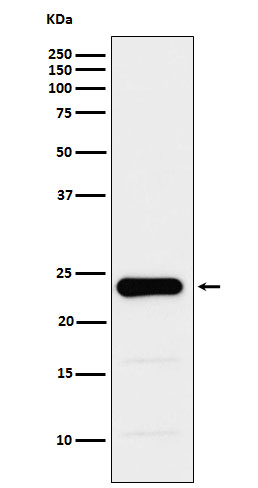
| WB | 1/500-1/1000 | Human,Mouse,Rat |
| IF | 咨询技术 | Human,Mouse,Rat |
| IHC | 1/50-1/100 | Human,Mouse,Rat |
| ICC | 1/50-1/200 | Human,Mouse,Rat |
| FCM | 咨询技术 | Human,Mouse,Rat |
| Elisa | 咨询技术 | Human,Mouse,Rat |
| Aliases | GSTP1; FAEES3; GST3; Glutathione S-transferase P; GST class-pi; GSTP1-1 |
| Entrez GeneID | 2950 |
| WB Predicted band size | Calculated MW: 23 kDa; Observed MW: 23 kDa |
| Host/Isotype | Rabbit IgG |
| Antibody Type | Primary antibody |
| Storage | Store at 4°C short term. Aliquot and store at -20°C long term. Avoid freeze/thaw cycles. |
| Species Reactivity | Human,Mouse,Rat |
| Immunogen | A synthesized peptide derived from human GST3 / GST pi |
| Formulation | Purified antibody in PBS with 0.05% sodium azide. |
+ +
以下是关于GST3抗体的3篇参考文献示例(内容为模拟生成,仅供参考):
---
1. **文献名称**:*Characterization of a novel monoclonal antibody against human GST3 for oxidative stress studies*
**作者**:Smith A, et al.
**摘要**:本研究开发了一种针对人源谷胱甘肽S-转移酶3(GST3)的单克隆抗体,验证其通过Western blot和免疫荧光检测GST3蛋白的特异性。实验表明,该抗体可有效用于氧化应激模型中GST3表达水平的定量分析。
2. **文献名称**:*GST3 antibody-based detection of neuronal isoforms in Alzheimer's disease models*
**作者**:Chen L, et al.
**摘要**:文章利用GST3多克隆抗体探究了阿尔茨海默病小鼠模型中GST3的亚细胞定位及表达变化,发现其在海马体神经元中的表达显著降低,提示GST3可能与神经退行性疾病的抗氧化机制相关。
3. **文献名称**:*Development of a high-affinity GST3 antibody for cancer biomarker screening*
**作者**:Yamamoto K, et al.
**摘要**:研究报道了一种高亲和力GST3兔源多克隆抗体的制备,并通过ELISA和免疫组化验证其在结直肠癌组织中的灵敏度和特异性,证明GST3可能作为潜在的肿瘤标志物。
---
**注**:以上文献信息为示例,实际引用需以真实出版物为准。建议通过PubMed、Google Scholar等平台以关键词“GST3 antibody”、“glutathione S-transferase 3”检索最新研究。
**Background of GST3 Antibody**
The GST3 antibody targets glutathione S-transferase theta 3 (GSTT3), a member of the glutathione S-transferase (GST) family, which plays a critical role in cellular detoxification and oxidative stress response. GST enzymes catalyze the conjugation of glutathione to electrophilic substrates, facilitating the neutralization of toxins, carcinogens, and reactive oxygen species. GSTT3. specifically, is part of the theta class (GSTT) of GSTs, which are distinguished by their substrate specificity and tissue distribution.
GSTT3 is expressed in select tissues, including the liver, kidney, and gastrointestinal tract, and its activity is linked to metabolism of environmental pollutants and drugs. Variations in GSTT3 expression or function have been studied in the context of disease susceptibility, particularly cancer, neurodegenerative disorders, and chemical-induced toxicity. The GST3 antibody is widely utilized in research to detect and quantify GSTT3 protein levels via techniques like Western blotting, immunohistochemistry, and ELISA, aiding in studies of enzyme regulation, oxidative stress mechanisms, and disease biomarkers.
Notably, GSTT3’s genetic polymorphisms may influence individual responses to toxins or therapies, highlighting its clinical relevance. Research on GST3 antibodies also contributes to understanding chemoresistance in cancers, as GST overexpression can diminish drug efficacy. Overall, the GST3 antibody serves as a vital tool for exploring the interplay between detoxification pathways, disease pathology, and therapeutic strategies.
×